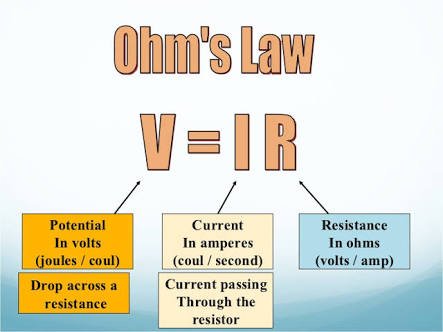Electric circuit theory- Ohm's law tutorial
.jpeg)
Image source
Ohm's Law is one of the most important things that you will use throughout your electrical career. It is a mathematical tool which is of the greatest use in determining an unknown factor of voltage, current or resistance in an electrical circuit in which the other two factors are unknown.
In case you missed the first post on electric circuit theory, kindly read here Electric circuit theory 1 tutorial
Assuming you don't have an ammeter or it has burnt while you want to measure the current in a circuit and where you can buy the device is very far. But you only have a Voltmeter, Do you know that you can still measure the current in the circuit?
Don't worry, I will explain how you will do that.
There was once a German Physicist called Georg Simon Ohm (1787-1854), he discovered ohm's law which is the relationship between Voltage, Current and Resistance in any DC electrical circuit.
The law is stated below,
Ohm's law state that current is directly proportional to the potential difference across its ends, but temperature and others physical conditions of a conductor are kept constant.
What are the things that kept constant?
These are the things that kept constant listed below;
- Resistance
- Length of conductor
- Area of the cross-section(thickness) of conductor
- Material of conductor.
- Temperature of the conductor.
Now, from the law, we can derive this mathematical expression.
V ∝ I
From knowledge of basic mathematics, proportional(∝ ) symbol can be replaced by =K, where K is constant. But here what kept constant is Resistance R which implies that we will replace ∝ with =R.
Hence, V=IR. -------------- 1.0
Where,
V= Voltage, measured in volt(V)
I= Current,measured in Ampere(A)
R= Resistance, measured in Ohms(Ω)
Do you understand what we just did?
If you don't, kindly reread from the beginning of the tutorial.
Now, let's continue
From equation 1.0, do you know we can derive an expression for Current and Resistance? Yes, we can, by just using changing of formula.
Expression for Current(I)
By making I the subject of formula in equation 1.
Just dividing both sides by R, then we have
I= V/R ......................... 1.1
Is it clear?
I believed it is clear, can derive an expression for Resistance R?
So by following the same procedure as we do while deriving an expression for current I, then we can say,
R=V/I ............................1.2
Now, let me explain how to measure current in the absence of ammeter, you will measure the voltage using the voltmeter you have, resistance value can be determined using coding method(I will write on how to use coding method in my next post), we can then use equation 1.1 to determine the current.
This is all about Ohm's law, some worked example and how to use coding method to know the value of a resistor will be posted on my next post. I'll only be writing once in a blue moon now because of Exam.
Reference
Physics tutorial on ohms law
Electronic tutorial- Ohms law
Code electrical- Ohms law
You can also read my previous tutorials:
Electric circuit theory 1 tutorial
Deriving of binomial expansion formula for two variables (a+b)^n
Easy method to derive binomial expansion formula
Tutorial on Combination
Explanation on why 0!=1
Congratulations @hayzeed! You have completed the following achievement on Steemit and have been rewarded with new badge(s) :
Click on the badge to view your Board of Honor.
If you no longer want to receive notifications, reply to this comment with the word
STOPDo not miss the last post from @steemitboard:
SteemitBoard World Cup Contest - The results, the winners and the prizes